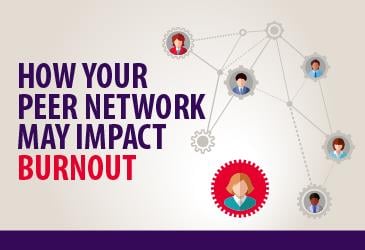 Can skipping social events with peers increase your chances for burnout? A recent study provides key findings on how loneliness and connectivity impact residents’ emotional well-being.
Can skipping social events with peers increase your chances for burnout? A recent study provides key findings on how loneliness and connectivity impact residents’ emotional well-being.
Burnout often is thought of as an “individual affliction,” but authors note that connections between individual residents create social networks, and these ties also allow individuals to influence each other. The study findings regarding social networks, burnout and loneliness were recently published in Academic Medicine. “Residency programs represent unique social networks, and we sought to investigate the relationship between burnout and loneliness.”
Authors of the study “hypothesized that residents with greater loneliness would have greater burnout, and that residents who are more central within their social network have less burnout.”
They tested their hypothesis on internal medicine residents using a survey containing the Maslach Burnout Inventory (MBI), a three-question loneliness scale and a social connectivity component.
High burnout rates linked to greater loneliness among residents
Many residents in the study reported “significant burnout” based on their MBI scores related to emotional exhaustion and depersonalization. Among respondents, 45 percent met the significant burnout criteria related to emotional exhaustion, 49 percent met the criteria for depersonalization and 33 percent met the criteria for both.
Study authors found that their hypothesis proved true: Residents reporting significant burnout also had higher loneliness scores based on responses to three questions on a three-point Likert scale, with responses “hardly ever” (representing one point), “some of the time” (two points) and “often” (three points). Questions on the loneliness scale measured residents’ “lack of perceived connection to others.” The questions were:
- How often do you feel that you lack companionship?
- How often do you feel left out?
- How often do you feel isolated from others?
Broken down by symptom, residents reporting significant burnout had higher loneliness scores than those who did not report significant burnout, which included:
- Residents reporting high emotional exhaustion also reported a 5.6 loneliness score, versus 4.5 for those who did not report significant burnout
- Residents reporting high depersonalization also reported a 5.4 loneliness score, versus 4.6
- Residents reporting both high emotional exhaustion and high depersonalization reported a 5.8 versus loneliness score, versus 4.6
Why personal accomplishment may lead to a more active peer network
To explore how residency programs may function as “social networks,” authors of the study also “had residents rate their connectivity to all other residents and used [the] data to generate two categories of social network outcomes: Degree (number of connections) and centrality (location and/or role within the network),” according to the study.
The study found that residents who had higher scores for personal accomplishment on the MBI survey also had greater “centrality within the residency” program and were more connected to their social network.
“Our study is the first to demonstrate a relationship between loneliness and burnout,” study authors wrote. “Those with greater burnout—meeting burnout criteria by both emotional and depersonalization—had higher loneliness scores. There was no significant relationship between social network measures of degree or centrality and emotional exhaustion and/or depersonalization scores. However, high personal accomplishment scores were associated with several social network measures.”
Although the study was limited to a single residency program, the authors noted that these findings provide a “starting point for future research to assess the effect of group and social networks on trainee burnout.”
Read the full study for additional observations.
Additional resources to help boost your personal well-being
- Learn five tips for eating healthy on a budget, offered by a medical trainee and registered dietician.
- Access a variety of expert financial advice for physicians, from managing medical school debt to planning for retirement.
- Read about the ways residents have found to conquer burnout.
- Discover three key tips for physicians in medical marriages to strengthen your connection with your partner as your career and relationship progress.




